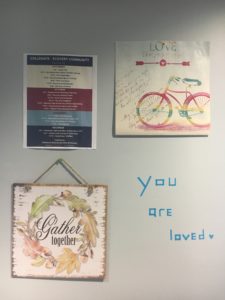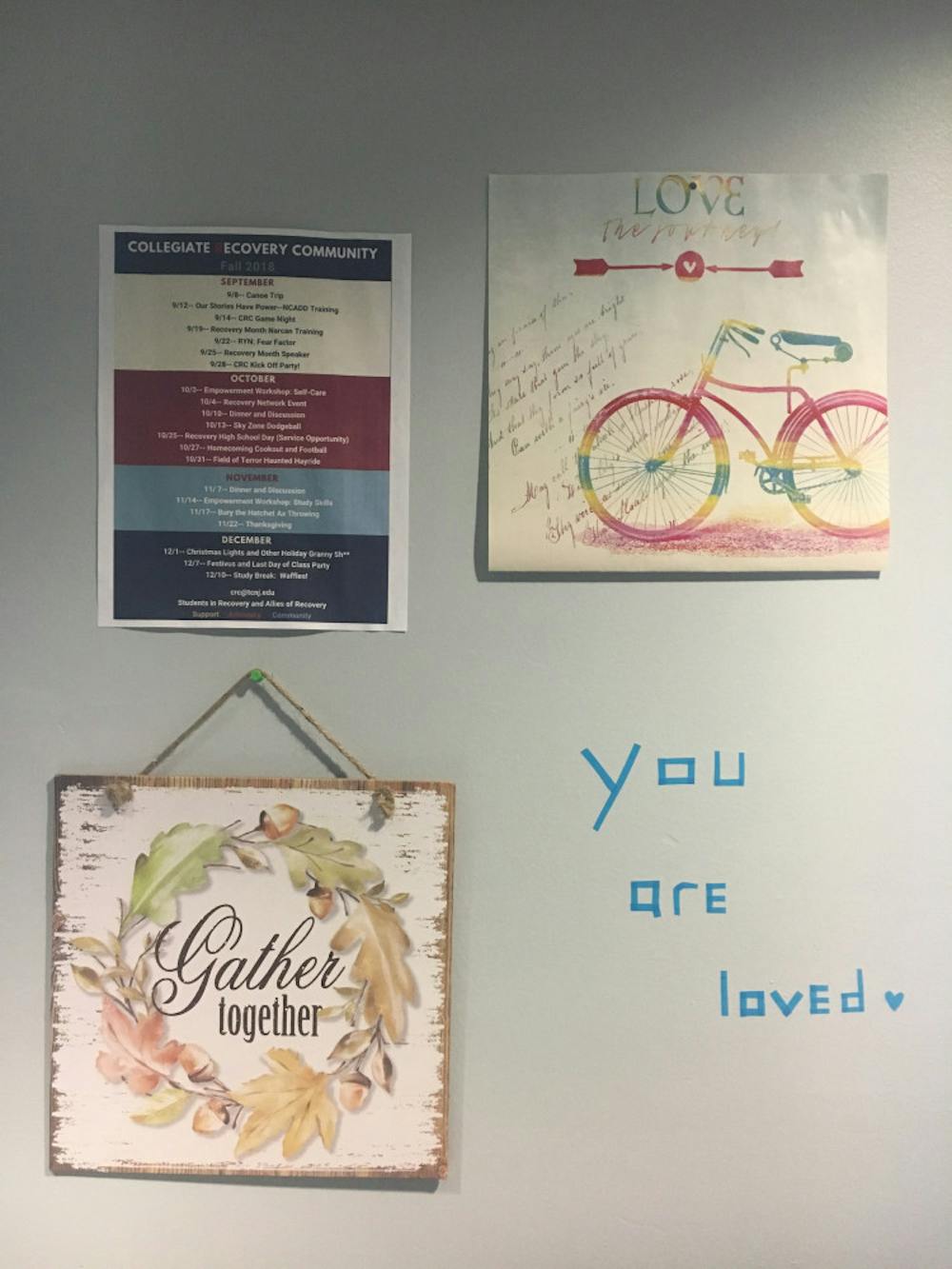By Lily Firth
News Editor
Recently, mental health and its relationship to substance abuse has risen to the forefront of nationwide issues on college campuses, and there have been numerous steps taken by both administrations and students to combat addiction.

Unhealthy drug use can lead to problems at school or work, physical health issues, neglected appearance, changes in behavior and even monetary issues, according to Mayo Clinic.
In 2015, the College took major steps in assisting students with substance abuse disorders. According to Christopher Freeman, the community recovery supervisor, the College implemented the Collegiate Recovery Program after receiving a grant from the state.
The CRP was conceptualized by a multi-departmental steering committee that worked together to identify the best ways to support students that have been impacted by substance use disorders. The program offers counseling services, substance-free housing and supports the Collegiate Recovery Community. The program also aims to spread awareness of the negative effects drugs have on their users.
The CRC is comprised of students in recovery and allies of recovery that focus on support, advocacy and community building. In addition to the CRC, the TCNJ Recovery Coalition is comprised of faculty, staff and alumni that care about issues related to recovery.
Three years after the creation of the CRP, the CRC is more active on campus than ever.
“The way we conceptualize and build the program is a dynamic process,” Freeman said.
“As more people become connected to the program and new needs become identified, we are able to adapt and add components to what we do. The larger the community grows the greater our capacity becomes.”
The community is indeed expanding. It is now able to support a 12-step program on campus, which takes place every Friday at 6:30 p.m. in Trenton Hall Room 106. The College also holds a Recovery High School Day, which brings high school students in recovery to campus.
According to the most recent American College Health Association / National College Health Assessment survey of the College’s students, 7.1 percent of students identified as having had a problem related to alcohol or drugs in their lifetime, and 3.8 percent of incoming students identified having a family member with a substance use disorder.
“Because we are an institution that is committed to all facets of student development and education, providing supports to students impacted by substance use disorders allows students to maximize their personal potential and growth, enhances their college experience and helps them become more engaged citizens,” Freeman said.
Freeman said that working with students in recovery and allies of recovery has been one of the most rewarding experiences of his professional life.
“Many of these students have real life underdog stories and have achieved so much despite the adversity they have experienced in their lives,” Freeman said. “They have emerged from adversity with greater compassion, depth of character and personal determination. It is an honor, and inspiration, to work with these students.”
Eric Van Eck, a 30-year-old public health major at the College, explained how the Collegiate Recovery Program has helped him. Van Eck first came to the College as a nursing major in 2006. Over the next few years, Van Eck was not exactly sure what he wanted to do with life, and changed majors multiple times.
During this confusing part of his life, Van Eck started to experiment with substances and he soon found himself addicted. His substance abuse and addiction eventually got him removed from the College in 2012.
According to Van Eck, the years following his removal from the College were challenging. At first, he was angry, and felt he did not need school since he could flourish on his own. He had created a landscaping and construction company when he was 14, which had provided him an income, but he was still using regularly.
The decision to turn his life around came when he reached a “spiritual, emotional and physical rock bottom.”
He ended up in the hospital and had to go to a rehabilitation center, where he finally realized that he was sick of the way he was living. He decided to go back to school when he heard that there was a newly implemented recovery program in place.
The most appealing part of the program for Van Eck was the “Lion’s House,” or substance-free housing. Located in Townhouses East, Lion’s House is a place for recovering students to live without substances, but also for students who just want to separate themselves from substances in general.
There are many reasons to live in the house — it appeals to athletes who want to focus on school rather than parties or students in search of an improved living situation after having with roommates who were frequently intoxicated. Every student in the house has to sign a contract prior to moving in, agreeing that they will not have any substances in the house and that they will not come back to the house under the influence.
“Although I’m only one of two recovering students in the house, everyone is really supportive of our disorder,” Van Eck said. “Our house is like it's own close-knit community. We support each other’s clubs and decorate the house with inspirational quotes. This housing has helped tremendously with my challenging return to school. It is a nice safe haven for me, knowing that I have a place to go and be comfortable to live in and not be confronted with people using.”
Currently, Van Eck is in his third semester back at the College.
So far, there has not been any incidents of students breaching the contract at the Lion’s House. Van Eck said that if a student relapsed with substances, housing would not just kick them out and leave them to fend on their own –– the program would help them recover, and would only remove them from housing if they keep refusing the help provided for them.
Van Eck said that the community is not judgemental and that there is no shame in relapsing — they just want to help residents overcome their substance abuse.
When asked why he chose to come back to the College, as opposed to applying to a different school, Van Eck said that he wanted to finish what he started years ago. He also said since the College is a prestigious school, and he did not want his previous hard work to be for nothing.
“It has been challenging being back,” Van Eck said. “I used to get my substances from Trenton, which is still nearby and always a temptation. Some of the older guys in fraternities remember me and keep asking me to come party. I’m surrounded by all of the bad memories of my struggle. But at the same time, it just reminds me of my past and what I can do to be better.”
Van Eck admitted that if the program was not in place, he is not sure if he would still be here or if he would have relapsed. He knew that even if he was still at the College, he would be “white knuckling” the experience the whole time, struggling and not getting the help he needed.
Today, he says that he is thriving at the College, thanks to the program’s encouragement. He has been earning excellent grades, is very involved in clubs and organizations at the College and is open about his past and his road to recovery.
“Rehab basically just tells you ‘good luck’ after you’re there for a certain amount of time and throws you back into the world with no help,” he said. “They’re setting you up to fail. With the recovery program at the College, they help you re-apply and get you back on your feet.”
Now that he is back in school, Van Eck feels like he has a new sense of purpose. He still has a lot of challenges to overcome, but he is dedicated to obtaining a disaster-relief job. He wants to help people who feel hopeless and make their lives better, as there were inspirational people who helped him when he felt like he was beyond repair.
Freeman is excited to see how the program expands over the next few years to help students in the best way possible.
“I think we are seeing a tremendously positive response as students are finding their voice through this program and gaining a sense of solidarity as they realize that they are not alone,” Freeman said. “Through this program, we are emphasizing that one’s recovery is a badge of honor and something to be proud about. I think because we are creating a community that is empowering, we are seeing a lot of interest and growth.”







